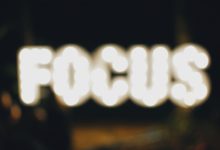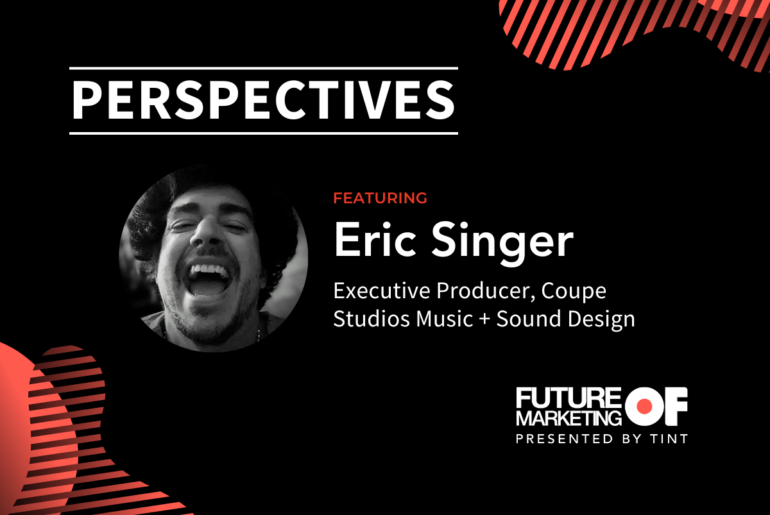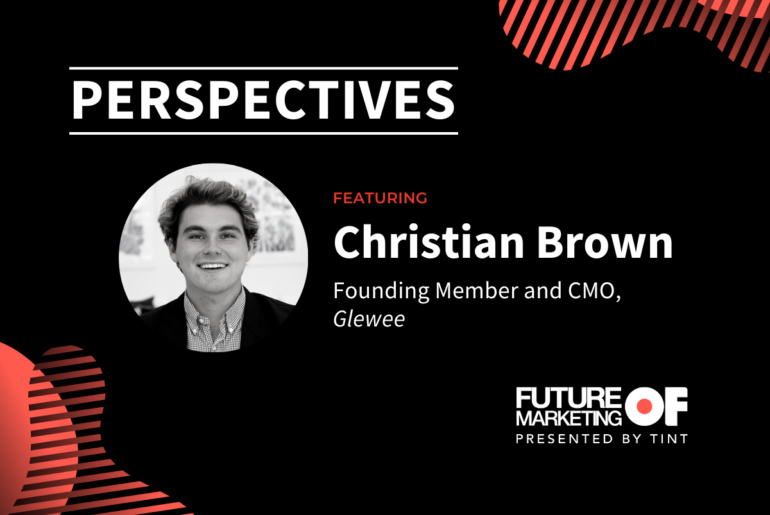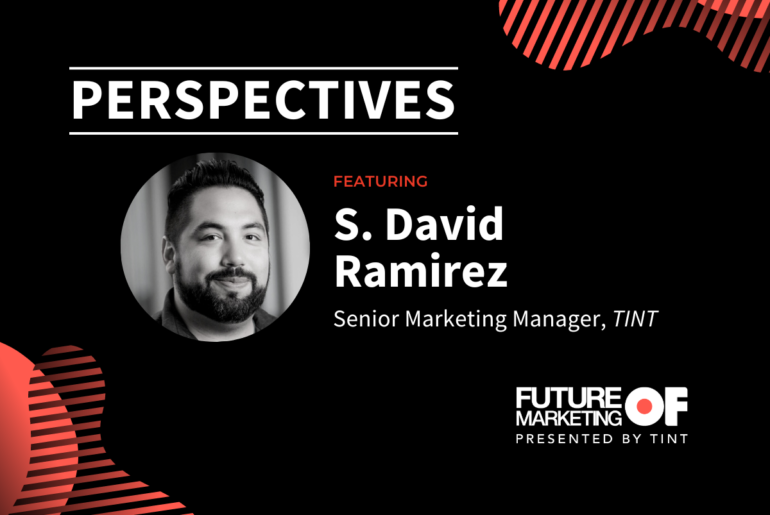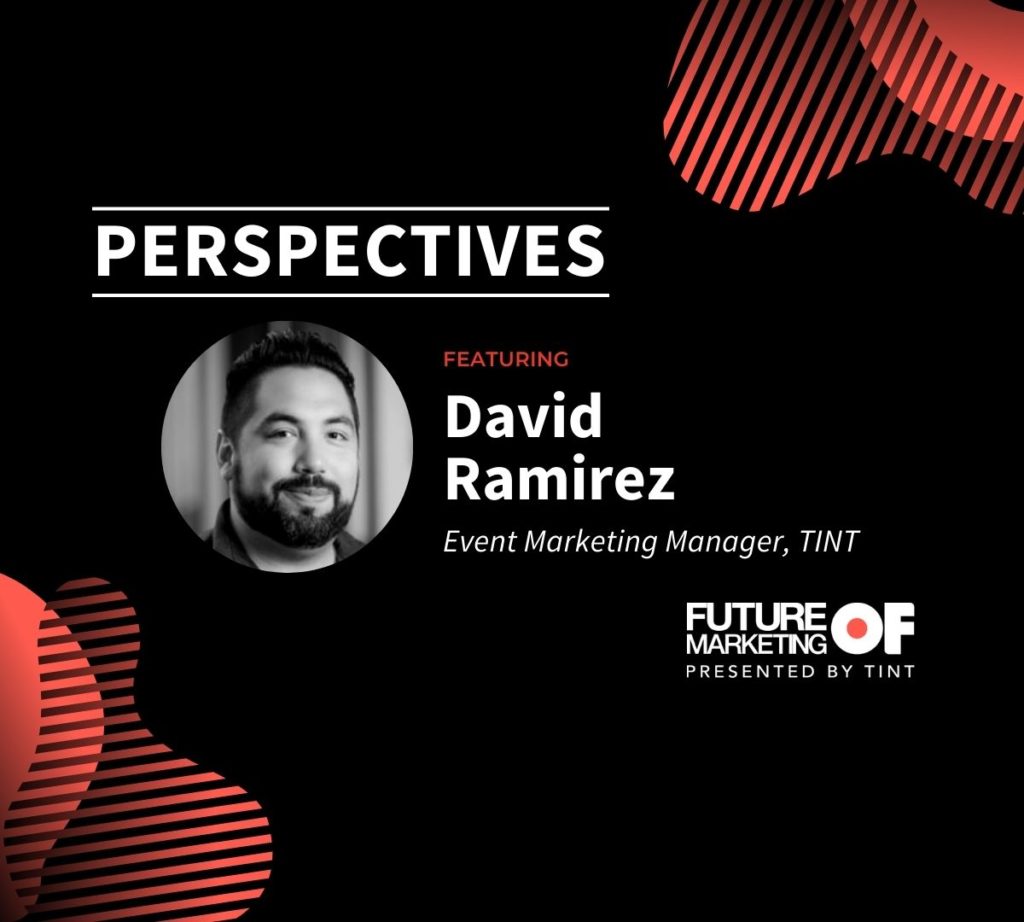
Perspectives is a series uncovering routines, inspiration, and insights by global brand leaders shaping the future of marketing.
EDITOR’S NOTE: David Ramirez is an Event Marketing Manager for TINT, the most powerful UGC platform in the world. He’s also an Executive Leader for San Japan, the largest Anime & Gaming Convention in South Texas.
David shares his perspective on the following:
• How to manage your inbox…
• How to communicate better…
• How to prepare for event marketing in the future…
And more…
Describe your routine. What does your typical day look like?
Mindi, our dog, always begs to go out around 6 a.m., so I start working early by reading through my news alerts, aggregators, and daily newsletters. Then I catch up on social feeds. A few of the industries I work in are centered abroad, so the action doesn’t stop overnight.
After the second cup of coffee, my inbox and daily to-do list get a once over. I love a paper list and my desk is littered with notepads and Post-Its. I had a previous manager who espoused Inbox Zero and I strive for it.
It took years for me to realize that I write better in the morning. I try to get 600 words out before noon on my writing days. Otherwise, I schedule external meetings, customer calls, and product/event exploratories in the morning when I am “fresh.”
I try to do a webinar during lunch. Try is the operative word. Sometimes the allure of scrolling through TikTok is too much and lunch is spent consuming micro-video along with food.
I feel like I can “math” better after lunch. Deep focus is a little easier on a full stomach. The afternoons are when I design, edit, research, or work on spreadsheets.
I end the day updating to-do lists, closing tabs, and cleaning up my desk. My workspaces have been notoriously messy so I’ve used quarantine to work on fighting that inclination towards chaos.
I always seek a natural stopping point. Sometimes it is earlier, sometimes later, sometimes very late. It helps to end the day with things accomplished so you don’t start a morning trying to recall where you left off.
How do you wind down from a long day of work?
My wind-down varies. I subscribe to some magazines and buy books in hard copy to get a break from screens.
My partner and I are always marathoning a couple of shows. Right now: 30 Rock (rewatch), Pose, Worst Cooks, and The Politician.
I end the day listening to an episode of a podcast in bed before going to sleep, nothing marketing-oriented so it is usually horror, Sci-Fi, or fantasy.
What is a book, podcast, person, or event that helped shape your career?
While in college, I joined a web community called NationStates. It was a governance simulator that allowed you to create your own country and simulate policy ranging from economic development to social structures. The community was first launched as a marketing promotion for a book called Jennifer Government by Maxx Barry.
I was blown away by the game and the community that developed to support it. I read the book and loved the mix of intrigue with political commentary.
Barry used to be a marketer for HP and writes a very specific type of business novel that is one-part marketing strategy, one-part corporate allegory, and entirely pop-fiction.
I’ve been reading his books for almost 20 years now and recommend them to anyone who has never read business fiction.
What is something interesting or surprising you learned in the last few months?
I’ve spent a surprising amount of time learning about aerosolization and fluid dynamics in the past month. This may seem like an odd topic for an event and content marketer, but this research will define the future of events.
Understanding how COVID-19 moves, travels, and survives in contained spaces is of the utmost importance if event organizers are to design activations that allow for the continuation of the events industry while keeping attendees and stakeholders safe.
Who or what do you look to for inspiration?
When I teach a marketing workshop, I always give the same intro spiel. Marketing should not be scary. Marketing is not magic. Marketing is the thoughtful application of influence through creative uses of psychology and sociology. The man who inspired this movement is Dr. Robert Cialdini.
His team is constantly developing new principles that help us understand marketing as an intersectional discipline that benefits from exposure to things like literature, media, culture, and the liberal arts. His perspective on “Ethical Influence” is a guide for anyone working in Advertising, Marketing, or Communications.
What do you feel most marketers struggle with?
I feel that marketers often struggle with talking to non-marketers, including our customers. We speak in coded language and when that language leaks into our marketer, our tools become less effective. I was facilitating a corporate retreat for an event production company.
As an exercise, we created a list of “bad words” that prevent progress. A lot of it was marketing and business lingo like synergy, leverage, bespoke, activate, etc. By pushing participants to speak meaningfully they were able to articulate actual meaning. Marketers need to understand that crutch words reduce efficacy and ambiguity is dangerous.
What advice do you have for marketers and creatives who look up to you?
Spend time early in your career to find the things you love and hate about marketing. We are moving to a world where full-stack marketing is becoming less of the norm. Find the things that will make you happy and strive to find opportunities where you can do them.
What are you excited about or looking forward to?
I’m excited to see how the marketing specializations I practice look after quarantine. Content Marketing is now producing a glut. Events have come to a standstill. Both are going to have major changes in the next 24 months that will affect the industry for the next decade.
What does the future of marketing look like to you?
The future of marketing is hyper-localization. People want to buy from brands that care, and are present, in their communities. They want to see a local impact. They want to eat at local establishments. They want to attend local events. The arrival of COVID-19 will increase that local-first drive as people becoming increasingly hesitant to travel.
As businesses become more lax about remote employees, they will discover that it helps with this local connection. Now it isn’t impossible to have people in 50 cities across North America. You can activate a local team to participate in events or just show face at a gathering. The future is local.
Do you know a marketer we should highlight in Perspectives? Send us a DM @thefutureofmktg to nominate a marketer shaping tomorrow’s trends.

